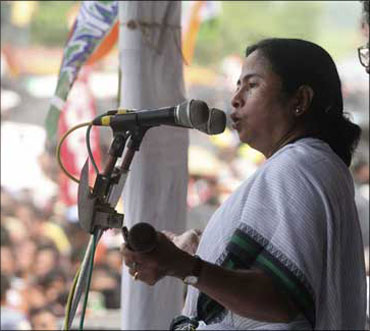
Railway Minister Mamata Banerjee is likely to present a populist Railway Budget on February 24, leaving passenger fares untouched but rationalising the freight rates keeping the essential commodities aside.
However, sources say that a marginal increase in air-conditioned class is possible.
Though the Railway Board is insisting on raising fares keeping the railways' financial condition in mind, insiders said the minister is 'dead against' carrying out any such revision.
The recession-hit industry may not be as lucky though, the Rail Budget to be tabled on February 24 is likely to rationalise freight rates of certain commodities like iron ore, coal and cement.
But according to sources, Mamata is unlikely to tinker with the freight rates of essential commodities including foodgrains.
There is a possibility of a minimum 5 to 10 per cent hike in the transportation charge of certain commodities including iron, coal and minerals. The hike in fuel prices is weighing heavily on railways.
Click NEXT to read what Mamata might have in store for you. . .

Railway Minister Mamata Banerjee is likely to announce the launch of almost a 100 new trains in the Railway Budget on February 24.
However, sources say that the Rail Budget will again mostly focus on West Bengal, Mamata's home state, as the state will soon be going to polls.
An Economic Times report said that 'apart from dozens of new trains for the state the rail minister may propose a commando training centre in Canning (West Bengal).
. . .
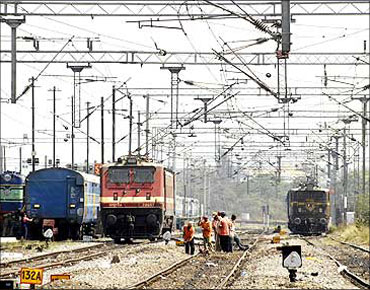
In a pre-Railway Budget wishlist, D P Agarwal, vice chairman and managing director, Transport Corporation of India, has listed his recommendations for the Railway Budget 2010-11 as follows:
. . .
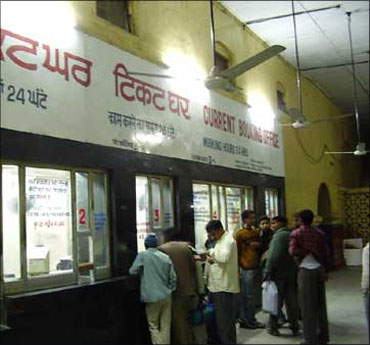
Indian Railways plans to set up a new, paid enquiry number 138 in a bid to provide faster services. The new number will provide many value-added passenger-related services.
The 138 number is also expected to ease the pressure on the existing 139 passenger inquiry number, which receives about 800,000 calls a day.
Sources say that the paid 138 enquiry number will complement the free 139 number,
An announcement on the number is likely to be made in the Railway Budget.
. . .

The railway ministry is considering several modalities to ring in changes in its catering policy, hoping to serve passengers with better meals and amenities, says Business Standard.
The change promised in Railway Minister Mamata Banerjee's budget speech for 2009-10 has not materialised thus far but the authorities maintain that she will announce the new policy in her budget for 2010-11.
A major issue under consideration before the Railway Board is whether to retain the pre-eminent position of its subsidiary, the Indian Railway Catering and Tourism Corporation (IRCTC), or to shear it of the catering job in the wake of criticism that the standard of food served on trains and in stations under its supervision had gone down considerably.
In case the Ministry intends to take over the supervision of the catering job, the IRCTC's wings will stand clipped to just selling tickets, providing bedrolls in trains and managing tourism packages.
The Railway Board aims at simplifying the licensing system for vendors in a bid to break the monopoly of some big players in the catering sector. The lack of competition is seen as the prime factor responsible for the fall in the standard of food served by these caterers.
To encourage small players, the ministry is considering putting a cap on the number of pantry cars a contractor could be allowed to operate. As against the present policy of allowing a contractor to run pantry cars in 30 trains, the ministry is seeking to restrict the number to 10. The ministry is also thinking of replacing the cotton bedrolls with polyester ones.
. . .
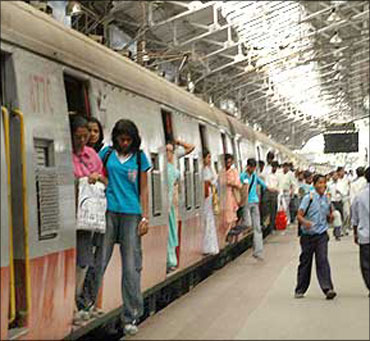
With barely days to go before the presentation of the Railway Budget, the railway ministry has said it has registered over eight per cent increase in earnings at Rs 70,501 crore (Rs 705.01 billion) during the ongoing financial year ending January 31.
"The growth was 8.56 per cent between April 1, 2009 to January 31, 2010 as Railways earned Rs 70,501.65 crore (Rs 705.016 billion) in comparison to Rs 64,943.32 crore (Rs 649.433 billion) it earned during the same period last year," said a senior railway ministry official.
The Railway Budget which will be presented on February 24 is likely to focus on increased public-private partnership to expend railway network and seek increased fund allocation for expediting ongoing railway infrastructure projects.
The official said the total goods earnings went up from Rs 44,035.66 crore (Rs 440.356 billion) to Rs 47,763.29 crore (Rs 477.632 billion) during this period while the passenger earnings also went up from Rs 18,057.41 crore (Rs 180.574 billion) to Rs 19,393.26 crore (Rs 193.932 billion).
. . .
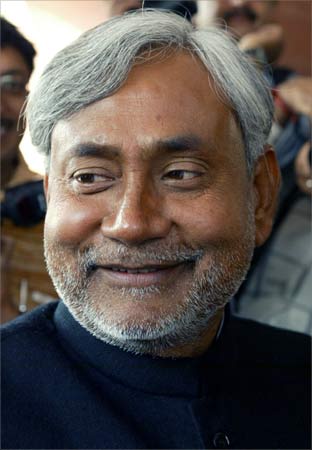
Bihar Chief Minister Nitish Kumar has asked for allocation of sufficient funds for the ongoing projects and introduction of new trains in the state.
Talking to reporters here after arriving from New Delhi, Kumar said he met the Railway Minister yesterday and apprised her the need of allocating sufficient funds in the forthcoming Railway Budget for the completion of the ongoing projects in Bihar.
Kumar said he had also written a letter to Banerjee urging her to make provisions for sufficient budgetary allocations for executing the pending projects and introduction of new trains.
"I have sent a list of important sanctioned projects for Bihar which are yet to be completed," he said.
Kumar said there were several projects sanctioned earlier which had not made expected progress due to insufficient funds.
The state government, he said, would provide all necessary assistance to railways for completion of these projects.
The list of 19 pending projects includes Harnaut workshop, Patna Ganga rail cum road bridge, Kosi bridge, setting up a wheel manufacturing plant at Chhapra, diesel locomotive manufacturing unit at Marhaura, greenfield electric loco manufacturing factory at Madhepura, rail-cum-road bridge at Munger and doubling of tracks in the remaining blocks on Patna-Gaya section.
. . .
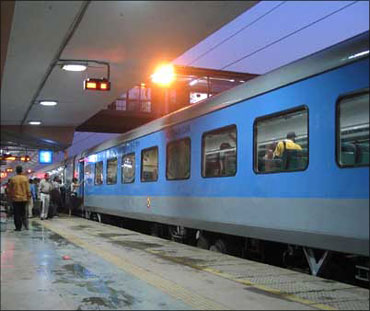
As in each year, the share prices of companies whose business is related to the railways have started moving up, ahead of the latter's budget, to be presented on February 24, says Business Standard.
The share prices of Kalindee Rail Nirman Engineers, Simplex Casting, Kernex Microsystems, Titagarh Wagons, Texmaco, Stone India and Hind Rectifiers witnessed a sharp rise of between five to 20 per cent in today's trading. Those of public sector companies like Container Corporation, BEML and Bharat Heavy Electricals witnessed modest gains: these, too, make products for the railways.
"Over the past few years, there have been no negative surprises in the Railway Budget and expectations are high. Prior to the Budget, these stocks are safe bets, as only these companies get all the railway-related orders for whatever initiatives are announced in the Budget," said equity advisor S P Tulsian.
He said these stocks generally witness a sharp run-up ahead of the Budget and fall significantly after the announcements.
There was an up move of five to 28 per cent in these stocks in three trading sessions after June 20 last year, before minister Mamata Banarjee was to present her first budget on July 3, following the victory of the United Progressive Alliance in Parliament elections. The stocks cooled off significantly after the budget.
Kalindee Rail, involved in installation of signalling and telecommunication projects and execution of gauge conversion, gained nearly 30 per cent in 10 trading sessions and was trading at over Rs 500 a share, before then railway minister Lalu Prasad was to present the Budget in 2008. The stock, however, slipped to around Rs 350 within the next few days, post-Budget.
In 2008, Kernex Micro, involved in monopoly business of train anti-collusion dividers, gained around 45 per cent in 10 trading sessions from a level of Rs 160 to Rs 230. In the 10 trading sessions, post-budget, the stock slipped back to around Rs 155.
Prior to the 2007 Railway Budget, Kernex Micro had gained 17 per cent in the five trading sessions from Rs 145, and post-Budget, the stock was back to the same level. In 2007, Kalindee Rail had gained 23 per cent in 10 trading sessions from Rs 160 prior to the Budget announcements. The stock was again traded at around Rs 160 in the next three trading sessions. A similar pattern was witnessed in 2006 as well and stocks which had gained significantly prior to the Budget fell sharply.